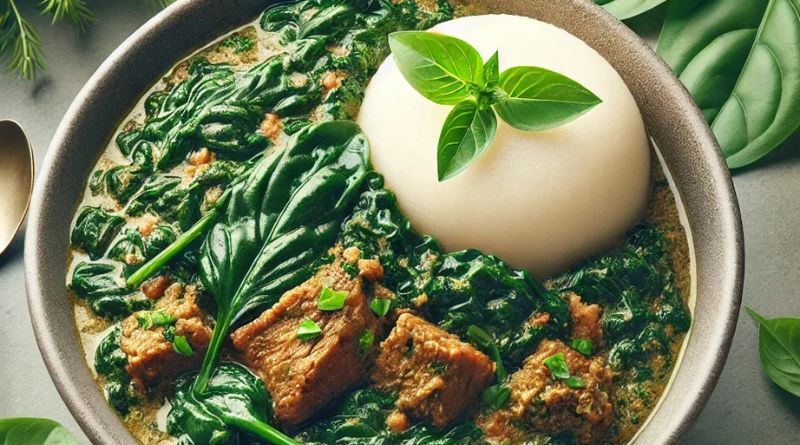Egusi soup and fufu are two beloved dishes that hold a special place in West African cuisine, particularly in Nigeria. Together, they create a hearty and satisfying meal that is rich in flavor and cultural significance. In this article, we will explore the origins, ingredients, preparation methods, and nutritional benefits of egusi soup and fufu, as well as answer some frequently asked questions about these delicious dishes.
Table of Contents
What is Egusi Soup?
Egusi soup is a thick, flavorful soup made from ground melon seeds known as egusi (Citrullus lanatus). These seeds are rich in protein, fats, and essential nutrients. The soup is often prepared with a variety of vegetables, meats, and seasonings, making it a versatile dish enjoyed by many.
Key Ingredients
- Egusi Seeds: The star ingredient, ground into a powder or paste.
- Vegetables: Common choices include spinach, kale, or pumpkin leaves.
- Proteins: Can include meats like chicken, goat, beef, or fish, as well as stockfish or shrimp.
- Seasonings: Onions, garlic, ginger, and spices like pepper, and seasoning cubes are often used to enhance the flavor.
- Oil: Palm oil is traditionally used for its rich flavor and color.
Preparation Method
- Preparation of Ingredients: Begin by grinding the egusi seeds into a fine powder. Chop the vegetables and prepare your choice of meat.
- Cooking the Meat: In a pot, cook the meat with water, seasoning, and spices until tender. This may take 30-45 minutes.
- Making the Soup: Once the meat is cooked, add the ground egusi, chopped vegetables, and palm oil. Stir well and let it simmer for about 10-15 minutes until the soup thickens.
- Serving: Egusi soup is typically served hot, often with a side of fufu or other starches.
What is Fufu?
Fufu is a starchy side dish made from various ingredients, including cassava, yams, or plantains. It is a staple in many West African households and serves as a perfect accompaniment to soups and stews, including egusi.
Key Ingredients
- Cassava: Often used for its smooth texture.
- Yams: A common choice that adds a subtle sweetness.
- Plantains: Can be used for a unique flavor twist.
Preparation Method
- Cooking the Base: Boil the cassava, yams, or plantains until tender.
- Pounding: Traditionally, the cooked ingredients are pounded in a mortar and pestle until smooth and stretchy. Alternatively, you can use a stand mixer for convenience.
- Shaping: Once pounded to a smooth consistency, fufu is shaped into balls or served in a bowl.
Nutritional Benefits
Egusi Soup
- High in Protein: Egusi seeds are a great source of plant-based protein, making the soup filling and nutritious.
- Healthy Fats: The seeds provide essential fatty acids that are beneficial for heart health.
- Vitamins and Minerals: The added vegetables contribute essential vitamins and minerals, promoting overall health.
Fufu
- Complex Carbohydrates: Fufu provides energy through complex carbohydrates, making it a great fuel source.
- Fiber: Ingredients like cassava and yams are rich in dietary fiber, aiding digestion.
FAQs About Egusi Soup and Fufu
1. Is egusi soup gluten-free?
Yes, egusi soup is naturally gluten-free as it is made from melon seeds and vegetables.
2. Can I make egusi soup vegetarian or vegan?
Absolutely! You can prepare egusi soup using vegetable broth and omit the meat, adding more vegetables or plant-based protein sources like tofu or legumes instead.
3. What can I serve with fufu besides egusi soup?
Fufu pairs well with various soups and stews, including okra soup, pepper soup, and vegetable soups.
4. How long does egusi soup last in the refrigerator?
Egusi soup can be stored in an airtight container in the refrigerator for up to 3-5 days. It can also be frozen for longer storage.
5. Can I use store-bought fufu?
Yes, there are instant fufu products available in stores that can save time. Just follow the instructions on the packaging for preparation.
Conclusion
Egusi soup and fufu are not just meals; they are a celebration of West African culture and culinary traditions. Rich in flavor, nutrients, and history, these dishes offer a delightful dining experience. Whether you’re enjoying them for the first time or you’re a seasoned fan, exploring egusi soup and fufu opens the door to the vibrant world of West African cuisine. So grab a bowl, a side of fufu, and enjoy the unique tastes and textures these dishes have to offer!



